Russia Editor, reporting from Minsk
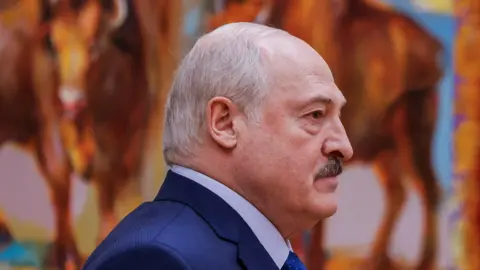 Reuters
ReutersThere are times in history when countries are gripped by election fever.
January 2025 in Belarus is not one of them.
Walk around Minsk and you won't see any large billboards promoting photos of the candidates.
There are few campaigns.
The gray skies and frost of a Belarusian winter add to the prevailing feeling of lethargy.
And determinism.
The outcome of the 2025 presidential election is not in doubt. Alexander Lukashenko, once dubbed “Europe's last dictator” and who ruled Belarus with an iron fist for more than 30 years, will be declared the winner and secure a seventh term in office.
Its supporters describe it as an exercise in “Belarusian democracy.” dispute He rejected the operation and described it as a “farce.”
Even Lukashenko himself claims that he lacks interest in this process.
“I'm not following the election campaign. I don't have time,” the Belarusian leader told workers at the Minsk automobile plant this week.
The workers gave him a gift: an ax to chop firewood.
“I will try it before the elections,” Lukashenko promised to loud applause.
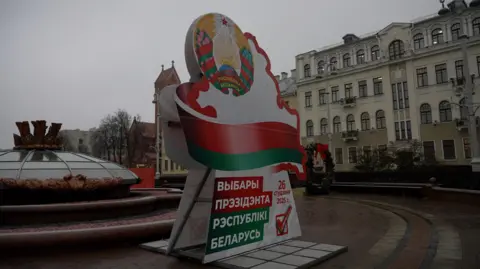
Four and a half years ago, at a different institution, the Belarusian leader received a much cooler reception.
One week after the 2020 presidential election, Alexander Lukashenko visited the Minsk Tractor Plant. A leaked video showed him being mocked and harassed by workers. They shouted, “Go away! Go away!”
In 2020, the official election result – 80% for Lukashenko – sparked outrage and massive protests across the country. Belarusians flocked to the streets to accuse their leader of stealing their votes and the elections.
In the brutal crackdown that followed, thousands of anti-government protesters and critics were arrested. A wave of repression eventually quashed the protests, and with Russia's help, Lukashenko clung to power.
The UK, EU and US refuse to recognize him as the legitimate president of Belarus.
Alexander Lukashenko's strongest opponents (and potential rivals) are either in prison or forced into exile.
That is why this week the European Parliament passed a resolution calling on the EU to reject the upcoming presidential elections as “sham” and indicating that the election campaign is taking place “in an environment of extreme repression that does not even meet the requirements.” Minimum standards for democratic elections.
I remember He interviewed Alexander Lukashenko last OctoberThe day the date of the presidential elections was announced.
He asked, “How can these elections be free and democratic if the opposition leaders are in prison or abroad?” I asked.
“Do you actually know who the opposition leaders are?” Lukashenko responded.
“The opposition is a group of people who should serve, at least, the interests of a few people in the country. Where are these leaders you are talking about? Wake up!”
Alexander Lukashenko is not the only candidate. There are four more. But they look more like spoilers than serious contenders.
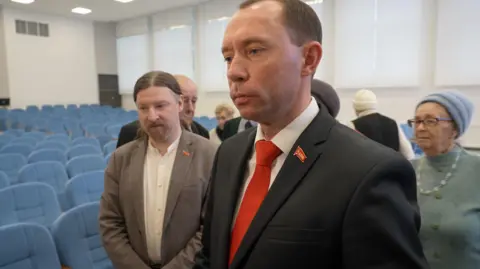
I drive four hours from Minsk to meet someone. Sergei Serankov is the leader of the Communist Party of Belarus. In Vitebsk, I was watching one of his campaign events. In a large hall, Mr. Serankov addresses a small audience, surrounded by his party's symbol, the hammer and sickle.
His campaign slogan is unusual, to say the least: “Not instead of Lukashenko, but with him!”
He is a presidential candidate who openly supports his opponent.
“There is no alternative to Alexander Lukashenko as the leader of our country,” Serankov told me. “So we are participating in the elections with the president’s team.”
“Why do you think there is no alternative?” I ask.
“Because Lukashenko is a man of the people, a man of the land, who did everything to make sure that we do not suffer from the kind of chaos that is happening in Ukraine.”
“You're fighting for power yourself, but you're supporting another candidate. That's…unusual,” I suggest.
“I'm sure Alexander Lukashenko will win in a landslide,” Serankov responds. “But even if he wins and I don't, the communists will win.”
“The main communist in our country is our head of state. Lukashenko still has his old membership card dating back to the days of the Soviet Communist Party.”
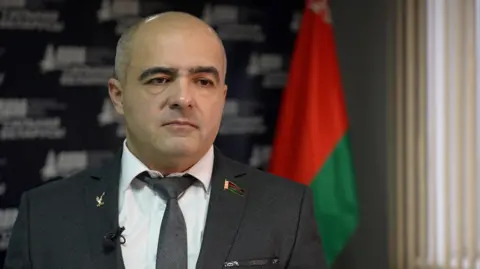
Also among the candidates is Oleg Gaidukevich, leader of the right-wing Liberal Democratic Party of Belarus. He also doesn't run to win.
“If anyone dares to suggest that the outcome of the election is unknown, he is a liar,” Gaidukevich told me.
“It is clear that Lukashenko will win. He has a tremendous rating… We will fight to strengthen our positions and prepare for the next elections.”
Lukashenko's critics refuse to assert that his popularity is “huge.” But there is no doubt that he has support.
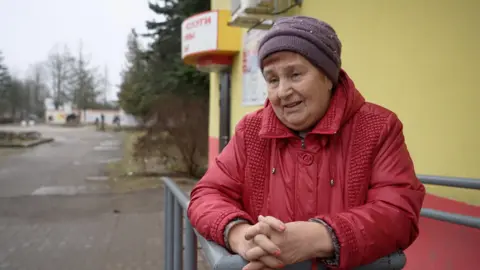
On the edge of Vitebsk is the small town of Oktyabrskaya. In talking with people there, I noticed concern that a change in leader would create instability.
“I want a steady salary and stability in the country,” the welder Sergey told me. “Other candidates make promises, but they may not keep them. I want to keep what I have.”
“The situation today is very tense,” says Zenaida. Maybe there are other people who deserve power. But by the time the younger leader gets his foot under the desk, establishing those important relationships with other nations, and with his own people, it will take a long time.
“God forbid we end up like Ukraine.”
In Belarus today there is a fear of instability, a fear of the unknown, and a fear of the government. Everything is working in favor of Alexander Lukashenko.




